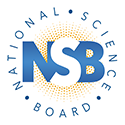

NSB/INT-06-8
May 2, 2006
George Washington University
Elliott School of International Affairs
1957 E Street 7th Floor, City View Room
Washington, D.C.
May 11, 2006
+ Invited, not yet confirmed
| 7:30 a.m. 8:00 a.m. | Registration, City View Room |
| 8:00 a.m. 8:10 a.m. | Opening Comments
|
| 8:10 a.m. 8:20 a.m. | Welcoming Remarks
|
| 8:20 a.m. 8:30 a.m. | Introductions and Overview of
Proceedings
|
| 8:30 a.m. 9:30 a.m. | Panel I The Role of Mission
Agencies in International Science Partnerships Focus Questions:
|
| 9:30 a.m. 10:45 a.m. | Break |
| 10:15 a.m. | Panel II Funding for
International Science Partnerships Focus Questions:
|
| 10:45 a.m. 11:00 a.m. | Break |
| 11:00 a.m. 12:15 p.m. | Panel III The Role of
Non-Governmental Organizations in International Science Focus Questions:
|
| 12:30 p.m. 1:30 p.m. | Lunch Keynote Address
(by invitation only) Dr. John H. Marburger, Science Advisor to the President and Director, Office of Science and Technology Policy The University Club, 1918 F Street |
| 1:45 p.m. 3:15 p.m. | Panel IV Policy Perspectives on
International Science Partnerships Focus Questions:
|
| 3:15 p.m. 3:30 p.m. | Summaries of Discussions and Next
Steps for the Task Force
|
| 4:00 p.m. 5:00 p.m. | Reception, City View
Room (by invitation only) Welcoming Remarks
|
| Dr. Michael Brown | Dean, Elliott School on International Affairs, GW |
| Ms. Cathleen Campbell | President and CEO, U.S. Civilian Research and Development Foundation |
| Mr. E. Bruce Howard | Deputy Director, Office of Science and Technology Cooperation, U.S. Department of State |
| Dr. P. Patrick Leahy+ | Acting Director, U.S. Geological Society |
| Dr. Kristin M. Lord | Special Adviser to the Under Secretary for Democracy and Global Affairs, U.S. Department of State |
| Mr. Franklin Moore | Director, Office of Environment and Science Policy, U.S. Agency for International Development |
| Dr. Raymond Orbach+ | Director, Office of Science, Department of Energy |
| Dr. Jeffrey Runge+ | Under Secretary for Science and Technology, Department of Homeland Security |
| Dr. Hratch Semerjian | Deputy Director, National Institute of Standards and Technology |
| Dr. Nicholas Vonortas | Director, Center for International Science and Technology Policy, GW |
| Dr. Thomas Weber | Director, Office of International Science and Engineering, National Science Foundation |
For more information, please contact Amanda Slocum at 703-292-7000 or aslocum@nsf.gov.
1 National Science Board. Charge to the Task Force on International Science. September 19, 2005 (NSB-05-134).
This Board Hearing and Roundtable Discussion on May 11, 2006 will focus on the current and potential role of the U.S. Federal government in achieving the following international science partnership policy objectives, stated in the task force charge:
Bruce Carpel and Joanna Rom
Executive Secretaries